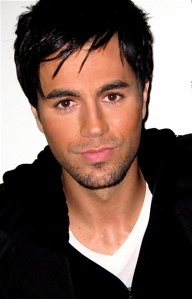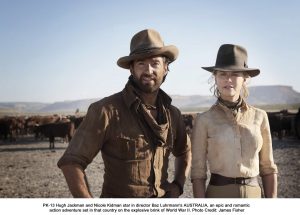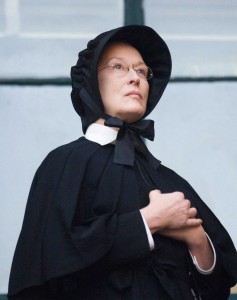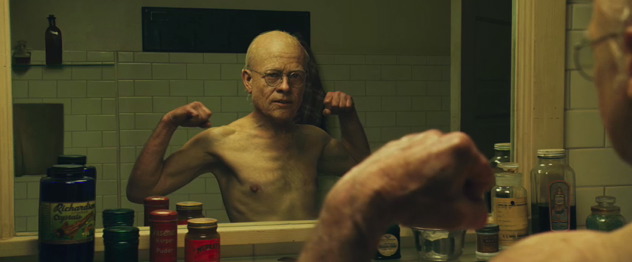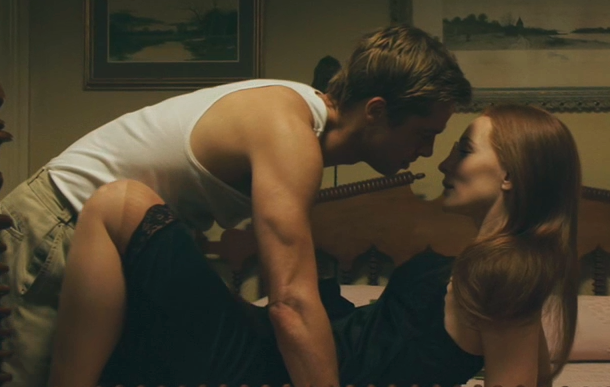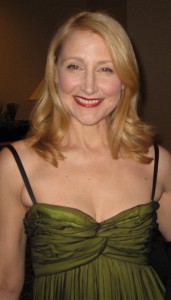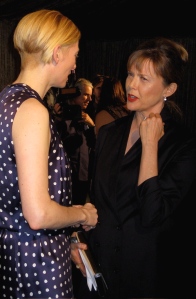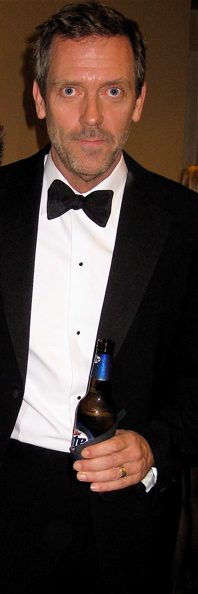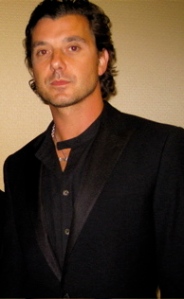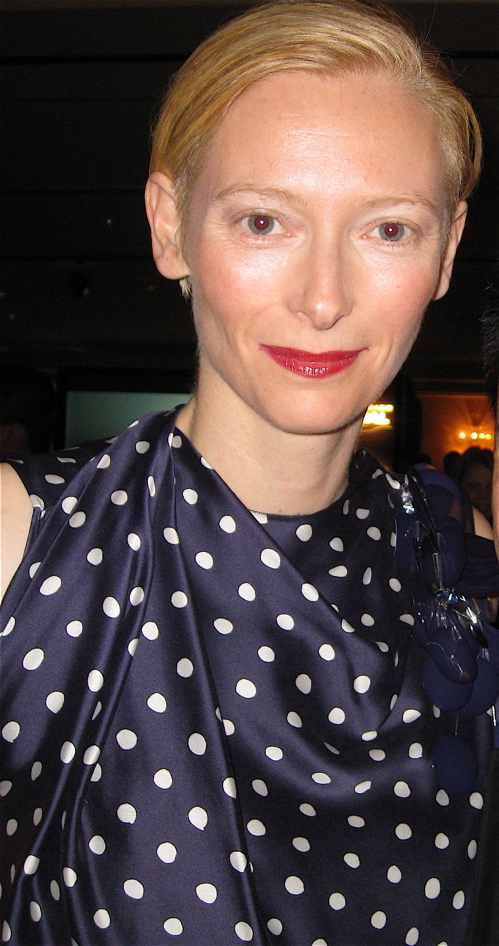After a screening of Doubt I attended at the TV Academy on November 19 (read my review here), Meryl Streep, Philip Seymour Hoffman, Amy Adams, Viola Davis and writer/director John Patrick Shanley came out to do Q & A. The session was highly entertaining, with Streep leading the hilarity, but the panelists also shared their insight and insecurities about the process of making movies.
**********************************
The moderator introduced Shanley first, then Davis, Adams, Hoffman and Streep, who received a standing ovation. After everyone was seated, the moderator directed his first question to Shanley. “Why did you write the play?”
Shanley said, “A few years ago, I noticed an atmosphere of uncertainty in this country. Doubt was being viewed as a weakness but I saw it as a great hallmark of strength.” He talked about how back in the ’60s, when he went to parochial school, he was taught certain rules about how things were even though he could feel that cultural shifts were coming. “Now, I’m in a time of great change; tectonic plates are moving again.”
The moderator asked the panelists in general, “What’s the most important theme for you [in this movie]?
Streep answered, “I’d seen the play and Cherry Jones do it. I was thunderstruck at her performance and wanted to steal it from her.” Huge audience laughter. “Just kidding.”
Shanley picked up the thread. “The theme that interested me was certainty, that tension that exists between people who felt things falling apart and trying to hold it together and people who wanted to let things fall where they fall.”
The moderator asked Streep, “Are you her? Are you that character?”
“Yes, I am, ” Streep deadpanned to big laughter. Then she told a story about being on location in Australia where everything is poisonous. Her children had a tendency to run everywhere, much to her chagrin (there were snakes around, among other things), while she noticed the Aborigine children never moved far from their mothers. “This is because the Aborigines have an uncle or family friend scare the shit out of the children, like, ‘Ahhhhhhh!’ [she screams] and they never leave their mothers’ side. Mother Superior is like that. It works.”
The moderator asked Streep and Hoffman about working together. Streep said, “I thought he didn’t like me the whole time.” (The person sitting next to me muttered under her breath, “Is she on crack? Why wouldn’t he?”)
“I adored working with her, just playing with her when we weren’t acting,” Hoffman said. “Acting with her is enjoyable and it’s not always enjoyable. The really good ones make it enjoyable.”
“What was your rehearsal process and prep time?” the moderator asked.
“Two weeks,” Shanley said.
“Three…?” Hoffman ventured.
“It seemed like two,” Shanley said.
“We did the room with the taped-off furniture,” Streep said.
Adams jumped in. “We had musical auditions next door. We had ‘Suddenly Seymour’ coming through the walls.” She continued, “The hard part [for me] was embracing a character who was so submissive and unsure of herself but having the confidence as an actor to be open to the challenges.” She then talked about the bonnet she wears in the movie as part of the nun’s habit. “It was fantastic; it was like having blinders on, literally [she cupped her hands on either side of her face to demonstrate having no peripheral vision]. I’d never been more focused in my life. I probably need it in my life!”
The moderator asked Shanley about the real Sister James, to whom he dedicated the movie.
“Sister James was my first-grade schoolteacher. When I wrote [the play], it was in full confidence that she was dead,” Shanley said, to huge laughter. On the play’s opening night, however, “to my horror, I found out she was coming. I hadn’t seen her in 48 years, since when I was 6. She was 70 [when I saw her again]. Together, we looked through this peculiar lens into the past. She loved the play, then brought many more nuns because nuns hang out with nuns. I wanted to dedicate the film to someone who had dedicated her life to service and never sought the limelight.”
“What was it like to have her on set?” the moderator asked.
“She said over and over again, ‘He was such a sweet boy,’ ” Streep answered.
The moderator asked Hoffman if he studied with a priest. Hoffman said he did do research with a priest with whom he had previously worked on a play called The Last Days of Judas Iscariot.
The moderator then addressed Davis. “You heard the reaction you got when I introduced you.” (She had received very hearty applause.)
Tongue firmly in cheek, Davis said, “It wasn’t the same as Meryl got.”
“You only had one scene really but made such an impact,” the moderator said.
“Being private in public was the most difficult thing for me. The most difficult thing is her candidness. I had to feel free enough to tell this woman everything even though she’s yelling at a kid when I first got there,” Davis said.
She then told a story about how she was born in South Carolina on a plantation and her family was from the deep South, where people grew up in the church, with “women with their big titties hanging out, singing songs.” Then her family moved to Rhode Island, where it was mostly Catholic. She said she wanted so badly to be part of the Catholic church but was thrown out for not being “one of them.”
Davis turned to the other cast members and said, “I don’t want to make you all feel uncomfortable but I felt like an outsider [on set] so it really informed my performance of the character.”
The moderator asked Shanley why he didn’t use the actors from the play.
“I wanted to see what the most talented cast I could dream up would do,” Shanley said.
At this point, the Q & A was opened up to the audience. Someone asked the stars in general, “What is your greatest challenge?”
Streep said, “I’m always afraid, because people always expect a germ of wisdom [from me]. I go into the process like everyone else—I’m too old, too fat, too overexposed, everyone has seen everything…we’re actors here, we’re all insecure, right? But our strength is our vulnerability. If you don’t feel inadequate, something’s…” she trails off. Then, “Fortunately, I have a family who makes me feel that way a lot.” Huge laughter from the audience. “I’m not kidding.”
The moderator asked, “Do you still have fears?”
“I’m scared right now,” Hoffman deadpanned. “My hand shakes, I forget to breathe for thirty seconds. It happened on this film.” He told a story about filming a scene in Doubt when he’s drinking tea. The sound person requested something be put on the saucer to settle it because it was rattling so much due to Hoffman’s shaking hands. But Hoffman protested. “I said, ‘Don’t put anything on that saucer. I have to attack the fear.’ “
Adams said, “I didn’t start working this much until my 30s. I’m blessed to do it but it’s terrifying every day. My goal is to be flawless someday,” she said.
An audience member asked, “What do you wish you knew then that you know now?”
“I wish I knew more about girls,” Hoffman said immediately.
“That being completely terrified is an occupational hazard,” Davis replied. “I went to do looping [re-recording dialogue that wasn’t perfectly recorded on set] and saw all that snot on my face and thought, ‘Meryl saw all that and didn’t tell me to use a Kleenex?’ ” The audience laughed. Davis continued, “I wish I had confidence and courage. You have to have a certain amount of it in your choices, even if you take the ball and run in the completely wrong direction.”
Adams said, “I wish I knew I’d work so much so I wouldn’t panic and spend my 20s in a tailspin. I wish I knew I looked better with red hair than as a blonde. It would’ve saved me a lot of highlights.” The audience laughed.
Another audience member asked, “How does it feel to know everything you do gets dissected on the blogosphere? Do you pay attention to it?”
Everyone shook their head. Then Streep said, “I was reading a lot of political blogs up until the the election but I don’t know how to get to those [other] blogs. Dateline Hollywood’s the only one I know.”
“My dad informs me of everything ever written about me,” Adams said.
Streep then said she wanted to go back and address the what-I-wish-I-knew-then question. “I wish I hadn’t worried about my weight so much all through my twenties. I think women worry so much about their weight while men just sit down.”
Hoffman protested. “I was one of those little kids in school who’d be sitting in the bleachers, looking at his thighs and touching them and thinking, ‘You’ve got fat thighs.’ I’ve been worrying about my tummy since I was 10.”
Streep continued, “I just think for young actresses, a lot of the time, they think they can’t get parts” if they don’t weigh within a certain range.
Next question from an audience member. “Do you still study?”
Streep answered, “No, I don’t study anymore except in working. I learned from everyone on this stage except you [she looked at the moderator]. I don’t write down notes or anything in my scripts, which makes them worthless on eBay. I just dream and think about it.”
The next audience member mentioned a scene in which Streep used a long pole to change a light bulb overhead, then walked with the pole vertically at her side to answer a knock at the door. The audience member thought it made Mother Aloysius “look like Death,” with her black cloak and pole, and wondered if that was Streep’s or Shanley’s idea.
“My choice,” Streep said immediately, to much laughter. “No, the director put a stick in my hand, but I was aware in the rehearsal that I looked like an old witch.”
An audience member wanted Shanley to discuss what nature represented in the film, with all the winds blowing in many scenes.
“This is the hardest script I ever wrote and I’ve written a few,” Shanley said. “I wanted to bring in the children, the parishioners, show the convent vs. the directory. I wanted to feed something to dramatize the forces of change this woman couldn’t keep at bay. Wind seemed like the obvious thing to exploit, the light bulb going out…she’s at war with the physical world.”
Another audience member directed her question to Adams. “How did you prepare?”
“It was very much on the page. I’d never rehearsed anything like this. Something spoke to me about her, her devotion to her vows and calling. In meeting Sister Peggy [aka Sister James, Shanley’s former teacher], she’s plucky, there’s an impishness and I stole that.” The audience laughed. Adams continued, “It was a lot of science. I listened more than I talked…”
“You were incredibly well-prepared,” Shanley said.
An audience member asked about the financial challenges Shanley encountered in getting the movie made.
“One day we spent some big bucks. People showed up the next day when we were shooting in the hallway, which was complicated, there was lots going on. The money people said, ‘You better get it in one shot.’ I got it in one take. But then Phil said, ‘I’m feeling a little rushed.'” The audience laughed. Shanley then concluded by saying the money people don’t show up when you spend the money, they show up the next day and try to get you to speed things up.
It was the final question of the evening, the moderator wrapped things up and the stars filed out to a final round of applause.
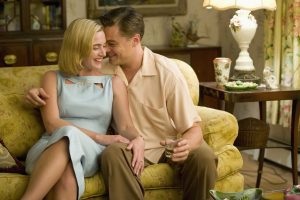 The obvious draw will be the reunion of Titanic lovebirds Leonardo DiCaprio and Kate Winslet, playing another period couple—this time in the 1950s—but engaged in a very different kind of relationship. Frank Wheeler (DiCaprio) meets April (Winslet) at a party when they’re both young and certain they’d set the world on fire. She’s studying to be an actress while he’s just back from the service, still figuring out his future. Fast forward to two kids and seven years later, her acting career has fizzled and he’s stuck in a soul-sucking cubicle job which he describes by saying, “There’s nothing interesting about it at all.” Desperate to infuse some passion and excitement back into their lives, April sells Frank on the idea of ditching everything and moving to Paris with their children. But complications ensue and the dream ends up far from a happy ending.
The obvious draw will be the reunion of Titanic lovebirds Leonardo DiCaprio and Kate Winslet, playing another period couple—this time in the 1950s—but engaged in a very different kind of relationship. Frank Wheeler (DiCaprio) meets April (Winslet) at a party when they’re both young and certain they’d set the world on fire. She’s studying to be an actress while he’s just back from the service, still figuring out his future. Fast forward to two kids and seven years later, her acting career has fizzled and he’s stuck in a soul-sucking cubicle job which he describes by saying, “There’s nothing interesting about it at all.” Desperate to infuse some passion and excitement back into their lives, April sells Frank on the idea of ditching everything and moving to Paris with their children. But complications ensue and the dream ends up far from a happy ending. DiCaprio and Winslet do wrenching work, taking Frank and April from a hopeful existence to a “hopeless emptiness.” The acting isn’t always natural, sometimes overly demonstrative and other times very fifties-style Stepford-ish. But the two stars manage to cut open Frank and April’s inner selves as if performing metaphorical open-heart surgery on each other and the result is just as bloody and raw.
DiCaprio and Winslet do wrenching work, taking Frank and April from a hopeful existence to a “hopeless emptiness.” The acting isn’t always natural, sometimes overly demonstrative and other times very fifties-style Stepford-ish. But the two stars manage to cut open Frank and April’s inner selves as if performing metaphorical open-heart surgery on each other and the result is just as bloody and raw. Besides the name of the road, other monikers also seem to mock what they represent. Wheelers are supposed to denote people on the move but this couple is paralyzed by inertia. Frank is not so much—he has moments of eruption but most of the time he puts on a smile and keeps his innermost thoughts to himself. And April, a word which usually symbolizes spring and a time of renewal, can’t seem to escape a lonely, unending winter.
Besides the name of the road, other monikers also seem to mock what they represent. Wheelers are supposed to denote people on the move but this couple is paralyzed by inertia. Frank is not so much—he has moments of eruption but most of the time he puts on a smile and keeps his innermost thoughts to himself. And April, a word which usually symbolizes spring and a time of renewal, can’t seem to escape a lonely, unending winter. Mendes has plumbed this territory before—Road is like American Beauty (it even has a similarly stark, piano score by Thomas Newman) with a younger couple and less black humor. He’s a brave man to embark on such a bleak exploration of marriage with his wife in the lead; the film’s even dedicated to their children. (I wouldn’t know WHAT to think if my parents dedicated a movie like this to me.) Road deserves to be seen and I’d recommend it, but be forewarned it will not add to your holiday cheer.
Mendes has plumbed this territory before—Road is like American Beauty (it even has a similarly stark, piano score by Thomas Newman) with a younger couple and less black humor. He’s a brave man to embark on such a bleak exploration of marriage with his wife in the lead; the film’s even dedicated to their children. (I wouldn’t know WHAT to think if my parents dedicated a movie like this to me.) Road deserves to be seen and I’d recommend it, but be forewarned it will not add to your holiday cheer.



